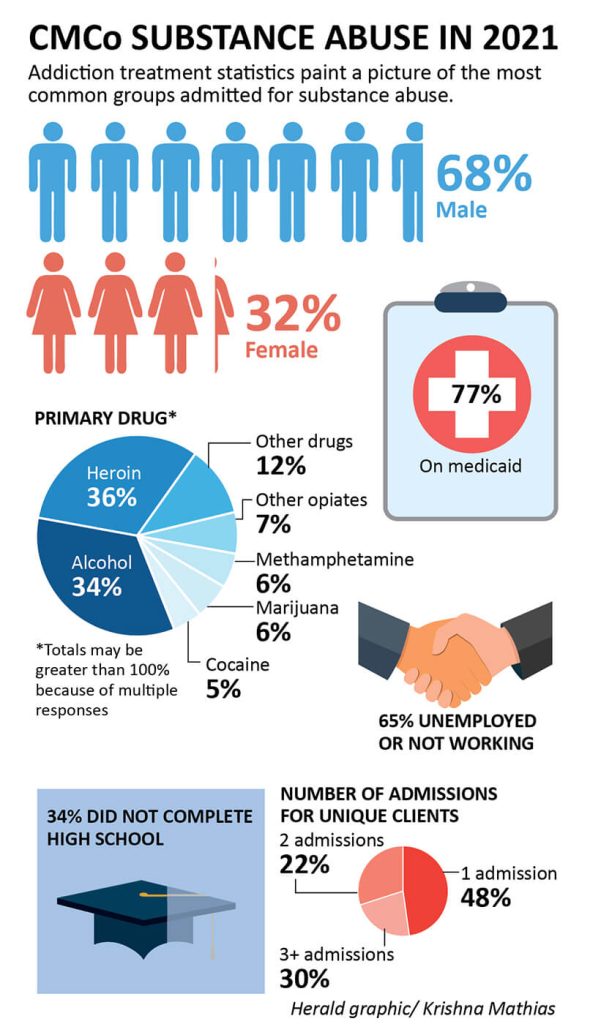COURT HOUSE – Superior Court Judge Bernard DeLury sentenced convicted drug dealer Richard Hawthorne to five years in state prison as part of a plea agreement on Aug. 19, 2022.
As part of the agreement, Hawthorne pleaded guilty to second-degree manslaughter for a drug-induced death for selling heroin to Burton Drake, leading to a fatal overdose on Nov. 27, 2020. Hawthorne will have to serve at least 85% of his prison sentence and serve five years of probation once released.
Heroin was the primary drug used by those seeking substance abuse treatment in Cape May County in 2021 at 36%. It was followed by alcohol at 34%, “other drugs” at 12% and “other opiates” at 7%. Most of those who are admitted for treatment are unemployed men. Over a third did not complete high school.
Though the statistics tell a story, the impact on those who are left behind shows the ripple effects of addiction.
In the courtroom, Drake’s wife related the impact Hawthorne had on her family by providing the drugs that killed her husband.
“My family is forever broken,” she said between tears.
Senior Assistant Prosecutor Edward Shim was also visibly shaken as he asked the court to deny jail credit when sentencing the defendant, saying, “Keeping people like the defendant off the streets will save lives.”
Speaking to the Herald, Shim reflected on the case and the impact drugs and fatal overdoses have on families in the community.
“As a prosecutor, you look at the case files and they are sterile, clinical,” Shim said. “But one thing I have learned is that behind each case are people who are impacted. Family members who find the victim.”
Shim said he ultimately meets the family members of fatal overdose victims, and he doesn’t enjoy seeing their pain. But as a member of the Cape May County Prosecutor’s Office, it is often up to him to guide the victim’s family through the legal process.
“When it is an active case, it’s a criminal case, and this is just a part of it,” he said.
He said most people get their understanding of the legal process from TV, which is not real. He said in some cases the victim’s family doesn’t want to be involved. In some cases, he said, the family can’t grieve until justice is done.
The prosecutor’s office has a Victims and Witnesses Unit, and Shim said he will get communication from them in advance of the trial. In other cases, families will contact the prosecutor’s office after it becomes a case. In any case, he said, the families want to know that somebody cares and is doing the best they can. But often the damage has been done.
“Behind each file is a family that is broken. Whether the case is solved or unsolved the family is still broken,” he said.
Shim started his professional life as a pharmacist and understands the problem of drug abuse and addiction. He said, as a pharmacist, he saw the signs of drug abuse developing. In the 1990s there was an increase in the abuse of pills. Shim said the Purdue Frederick business model introduced highly addictive drugs to the public, including Valium, Vicodin, and Oxycontin.
“Valium was the first pill of this sort that became a recreational drug,” Shim said. “Years ago, people logically used drugs. That they would be used recreationally is mind-boggling.”
Today, he said, the problem is fentanyl, a synthetic opiate that is as much as 100 times more potent than morphine, and many times more potent than heroin. If 30 milligrams of heroin are enough to kill the average-sized adult male, it only takes 3 milligrams of fentanyl to cause death. And because people are buying drugs off the street, they have no way of knowing what they are getting.
Former New Jersey Gov. James McGreevey, who heads the New Jersey Reentry Corporation (NJRC) for released offenders, said when they test NJRC participants while they are symptomatic from reported heroin use, there is no heroin in their system.
Speaking at a Sept. 9, 2022 workshop, McGreevey said, “Of those being tested for heroin, there was not heroin, it’s 100% fentanyl.”
At the annual Overdose Awareness Day earlier this fall, Cape May County Sheriff Robert Nolan said drug users, once arrested, beginto lose tolerance for their drug of choice. He said when they are released and use again, it can have fatal consequences.
Shim said fatal overdose victims generally have been users. He said in the case Hawthorne was sentenced for, the affected family was the all-American sort of family, a husband, wife, and two kids, living in a house with a picket fence, all belying a problem that was seemingly in the past. The decision to use heroin, again, showed how the drug can penetrate the facade of a happy, normal life.
Shim told of a man whose stepson struggled with addiction and was getting help through drug court, which allows people to address their addiction and stay out of prison. However, the stepson obtained heroin while he was involved in drug court and suffered a fatal overdose. His mother, devastated by her son’s death, took her own life.
“When I am near these people, the sadness is palpable,” Shim said. “They motivate me to try to get some semblance of normalcy for them.”
Shim said law enforcement still must make arrests, and the courts must still punish offenders to deter drug use. But he feels if society is to get out of this problem it needs to educate people about what can happen from illicit drug use and that lives can be lost in a second.
“The solution has to be in the people. They have to want to avoid the stigma and the legal process,” Shim said.
Tonia Ahern, who works with the Mental Health Association as a family advocate, also believes education is an important element in the battle against addiction and consequently, fatal overdoses. Ahern’s own son battled with addiction for years before his death from an overdose at 29.
Ahern, however, believes people, in general, need to be educated about the nature of addiction.
“I know someone always wants to hold someone accountable. We all want that as family members. Fentanyl is a powerful drug and is killing people,” she said. “But I have a different view because of the work I do.”
Ahern works with people who are using, people in recovery, and with family members. She said there is a big need for education on the nature of addiction and the underlying causes.
Ahern lost her son at 29 after he struggled with addiction for 14 years. She, in fact, stopped his overdoses five times before the fatal overdose. In fact, in 2021, 30% of all admissions for substance abuse had three or more admissions for drug treatment. Roughly half were being admitted for the first time.
She said addiction often stems from mental health issues and trauma, and from the system that attempts to deal with addiction. Ahern said when her son died, he had fentanyl in his system, but he had other medical issues as well.
“He was a dangerous user. He was always at risk,” Ahern said.
Ahern said she tried to work with her son on harm reduction. She said some people are afraid to seek treatment, which is one of the things many addicts face due to underlying mental health issues.
“My son wasn’t that person,” she said. “He was very open with me, and it was something we talked about a lot.”
Ahern said there is an idea that is circulated saying that if your friend sold you something they were trying to hurt you. She said her son did not believe that and if he was harmed by something a friend sold him, he would not want that friend to be harmed.
“I see how people who use substances lie for each other, pick up something for someone else, they will sell something to support their habit, and I think everyone is too quick to say everyone involved should be held accountable,” she said.
Ahern said the same people who are selling to support their own habits are also suffering the mental health challenges and trauma that other users are. She said society needs the resources to treat all addiction and related problems rather than say that if someone dies everyone should be prosecuted.
She said its more complicated than that, and it was her son who helped her understand this.
“The greatest gift my son gave me was the insight into how his mind worked and how other people’s minds worked,” she said. “People think users are bad people and some who are users say these are the only people who care about me.”
Ahern said people self-medicate because they are trying to address an issue no one else is addressing.
“Instead, educate people on mental health issues, and teach them to say, ‘I need help.’ Why are we not teaching this to children and letting them be part of the solution?” she said.
Thoughts? Questions? Email csouth@cmcherald.com or call him at 609-886-8600 ext. 128.
Cape May – Last week I witnessed a woman helping a man who seemed to be having difficulty getting up in the water. the next thing I saw was she also was injured. My Uber ride was there to take me to the…








